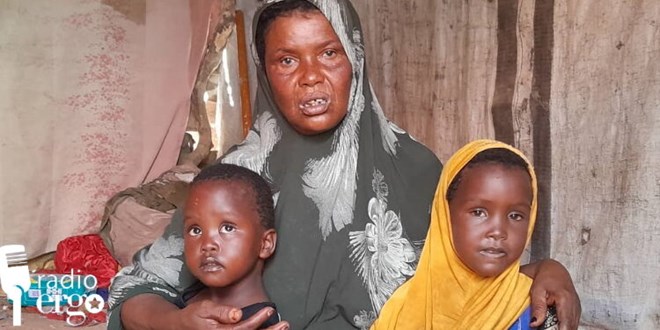
Thursday May 11, 2023

Jamilo takes care of her younger children in Badbahdo IDP camp while her 13-year-old son goes out to work/Abdisalan Hassan/Ergo
(ERGO) – Jamilo Ishkoow Omar, a mother of seven, pulled her 13-year-old eldest son out of school in January and sent him out to work, as life for their impoverished family living in a camp in the central Somali town of Adado became impossible.
The family left Qalafe, in Ethiopia’s Somali region, after losing their herd of 150 goats in 2017. Jamilo’s husband died the same year, forcing her and the children to join Badbado camp in Adado.
A rising number of children in the camp are leaving school to work for their destitute displaced families, according to teachers.
“The reason I removed him from school is because I have younger children that I have to babysit so I sent him to the city and ask him to earn for us. Sometimes he finds something, sometimes he doesn’t.
We have nothing, we are poor and displaced people and there is no father working for us, so that’s why I tell them to look for something we can eat. This problem bothers me. Other children his age are learning, but we have this problem,” Jamilo explained.
She used to wash clothes and collect garbage until being bitten by a snake on her hand while sleeping in her hut on 21 December. She stayed in her house in the camp for two months without seeking any medical treatment as she had no money. As a result her hand is paralysed and she cannot work.
She depends on her son to earn a living now so they can cook one family meal in the evening. He earns $2-$3 a day washing cars, roaming the city markets all day looking for jobs.
“When the boy works, whatever little he earns we use it to buy food and whatever else we can buy with the money. Sometimes, we buy a kilo of rice and vegetables. Sometimes we get two dollars, sometimes three dollars, and we cook whatever we get. It’s not enough to live on, but we are living,” she said ironically.
Jamilo had enrolled her son in school in the camp in 2020. He would now be in eighth grade if their circumstances had not made it inevitable for him to start working for the family.
Her biggest worry is the violent attacks young children encounter returning from work at dusk. Her son has been robbed by bigger boys a few times and if he loads the cash he earns onto the phone he can still be beaten up.
“When I send my child to the city and he is gone all day, by God, I get very afraid. I wonder will he come back and will I see him again? Sometimes other children beat him up, sometimes he comes back without his tools and sometimes with them. I am very worried about this but the circumstances have forced us because if there’s no father to work for the children and they are hungry, we don’t have a choice,” she said.
Jamilo’s three other children of school age are at home as she says with her disability she cannot afford the pens, books and other costs of education.
Another mother in the camp, Hamdi Hussein Issa, also sent her eldest child out to earn a living. She hawks samosas in the streets but demand has been dwindling as people generally have less money to spend.
She decided to pluck her 11-year-old son out of school and send him to look for shoe shining jobs. The boy earns $2-3 a day that enables them to buy white rice and tea. Her two younger daughters are also at home as Hamdi cannot afford their school stationery.
“I’m worried about this issue, I don’t sleep at night, the boy is not learning and he has taken up his father’s position. I would like him to learn something. I get worried because we want education and we also want food. If we were to be helped with the children, I would leave it to them to continue with their schooling,” she said.
Hamdi’s family came to the camp in January 2022, after their 70 goats perished in Galinsoor, Galgadud. Since then, she says their living conditions have steadily worsened and currently they are at their worst.
She takes loans from a shop whenever her son brings no money home and has chalked up a debt of $45. She tried to find laundry jobs but says the drought has affected everybody and households cannot afford to hire someone to wash their clothes.
Her son was in sixth grade in middle school. Hamdi told Radio Ergo she hopes that if they can get other livelihood support, when he reaches 15 he can drop the shoe shining job and return to school.
The principal of Mandeq school in the camp, Mohamed Haji Bir, said that in the last two years the number of children leaving the school to work has been increasing.
This year already 123 students have dropped out. There are just 158 students now enrolled in this free tuition school.
The principal said the teachers try to inform the parents about the importance of education although many are not convinced. He is pessimistic that those who have left will ever return to the classroom.
“When a child learns how to earn $2 or $3 and sees money in their pocket or if they are encouraged to work at a young age, they get a working person’s mindset. When they get older, they will decide to keep working,” Mohamed said.